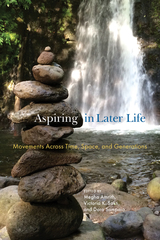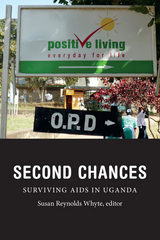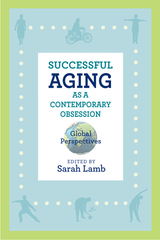3 books by Whyte, Susan Reynolds

Aspiring in Later Life
Movements across Time, Space, and Generations
Megha Amrith
Rutgers University Press, 2023
In our highly interconnected and globalized world, people often pursue their aspirations in multiple places. Yet in public and scholarly debates, aspirations are often seen as the realm of younger, mobile generations, since they are assumed to hold the greatest potential for shaping the future. This volume flips this perspective on its head by exploring how aspirations are constructed from the vantage point of later life, and shows how they are pursued across time, space, and generations. The aspirations of older people are diverse, and relate not only to aging itself but also to planning the next generation’s future, preparing an "ideal" retirement, searching for intimacy and self-realization, and confronting death and afterlives. Aspiring in Later Life brings together rich ethnographic cases from different regions of the world, offering original insights into how aspirations shift over the course of life and how they are pursued in contexts of translocal mobility.
This book is also freely available online as an open-access digital edition.
Download the open access book here.
This book is also freely available online as an open-access digital edition.
Download the open access book here.
[more]

Second Chances
Surviving AIDS in Uganda
Susan Reynolds Whyte, editor
Duke University Press, 2014
During the first decade of this millennium, many thousands of people in Uganda who otherwise would have died from AIDS got second chances at life. A massive global health intervention, the scaling up of antiretroviral therapy (ART), saved them and created a generation of people who learned to live with treatment. As clients they joined programs that offered free antiretroviral medicine and encouraged "positive living." Because ART is not a cure but a lifelong treatment regime, its consequences are far-reaching for society, families, and individuals. Drawing on personal accounts and a broad knowledge of Ugandan culture and history, the essays in this collection explore ART from the perspective of those who received second chances. Their concerns about treatment, partners, children, work, food, and bodies reveal the essential sociality of Ugandan life. The collection is based on research undertaken by a team of social scientists including both Western and African scholars.
Contributors. Phoebe Kajubi, David Kyaddondo, Lotte Meinert, Hanne O. Mogensen, Godfrey Etyang Siu, Jenipher Twebaze, Michael A. Whyte, Susan Reynolds Whyte
Contributors. Phoebe Kajubi, David Kyaddondo, Lotte Meinert, Hanne O. Mogensen, Godfrey Etyang Siu, Jenipher Twebaze, Michael A. Whyte, Susan Reynolds Whyte
[more]

Successful Aging as a Contemporary Obsession
Global Perspectives
Lamb, Sarah
Rutgers University Press, 2017
In recent decades, the North American public has pursued an inspirational vision of successful aging—striving through medical technique and individual effort to eradicate the declines, vulnerabilities, and dependencies previously commonly associated with old age. On the face of it, this bold new vision of successful, healthy, and active aging is highly appealing. But it also rests on a deep cultural discomfort with aging and being old.
The contributors to Successful Aging as a Contemporary Obsession explore how the successful aging movement is playing out across five continents. Their chapters investigate a variety of people, including Catholic nuns in the United States; Hindu ashram dwellers; older American women seeking plastic surgery; aging African-American lesbians and gay men in the District of Columbia; Chicago home health care workers and their aging clients; Mexican men foregoing Viagra; dementia and Alzheimer sufferers in the United States and Brazil; and aging policies in Denmark, Poland, India, China, Japan, and Uganda. This book offers a fresh look at a major cultural and public health movement of our time, questioning what has become for many a taken-for-granted goal—aging in a way that almost denies aging itself.
The contributors to Successful Aging as a Contemporary Obsession explore how the successful aging movement is playing out across five continents. Their chapters investigate a variety of people, including Catholic nuns in the United States; Hindu ashram dwellers; older American women seeking plastic surgery; aging African-American lesbians and gay men in the District of Columbia; Chicago home health care workers and their aging clients; Mexican men foregoing Viagra; dementia and Alzheimer sufferers in the United States and Brazil; and aging policies in Denmark, Poland, India, China, Japan, and Uganda. This book offers a fresh look at a major cultural and public health movement of our time, questioning what has become for many a taken-for-granted goal—aging in a way that almost denies aging itself.
[more]
READERS
Browse our collection.
PUBLISHERS
See BiblioVault's publisher services.
STUDENT SERVICES
Files for college accessibility offices.
UChicago Accessibility Resources
home | accessibility | search | about | contact us
BiblioVault ® 2001 - 2024
The University of Chicago Press









